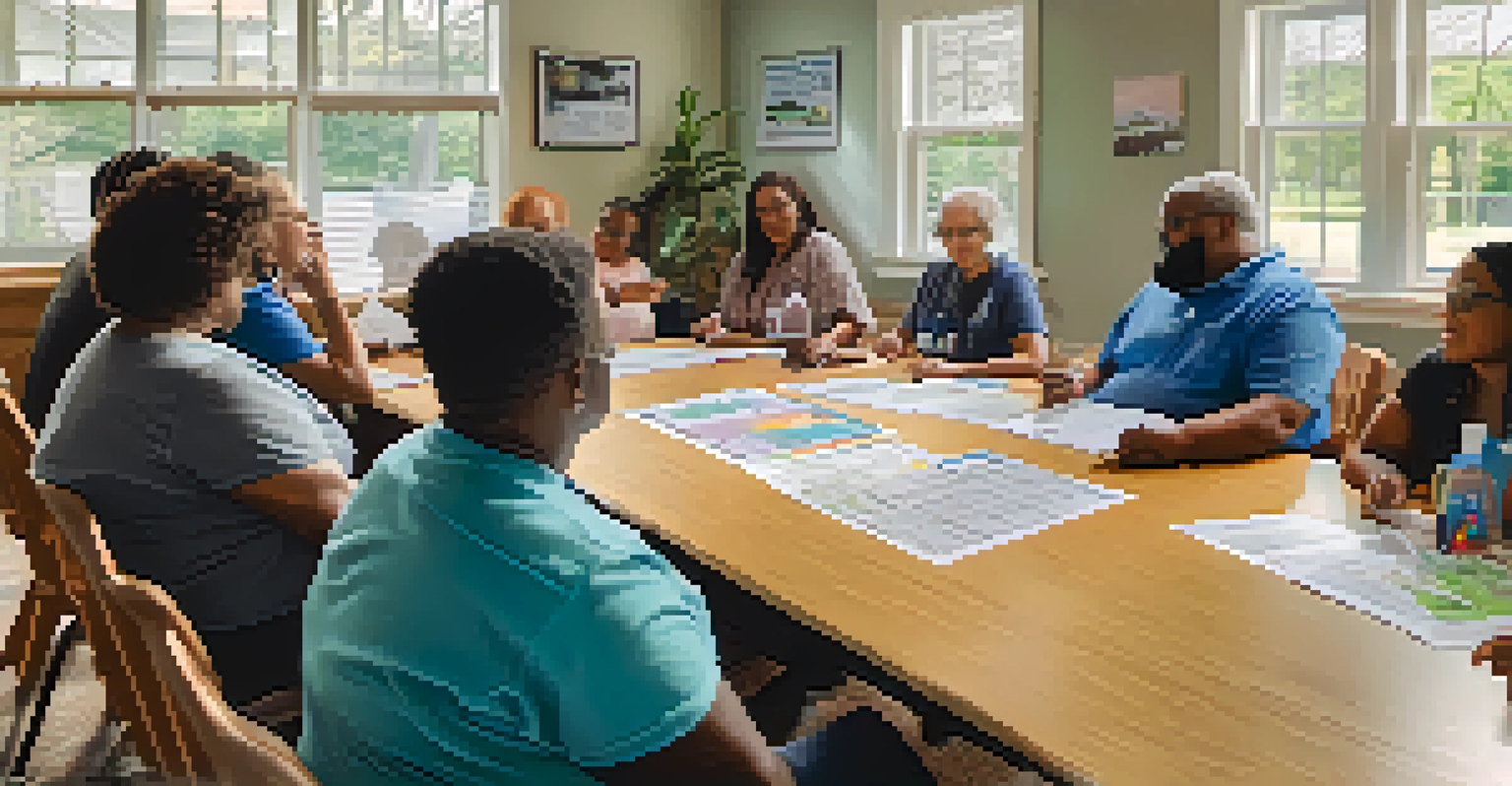Affordability Crisis: Charlotte's Real Estate Challenges

Understanding Charlotte's Real Estate Market Dynamics
Charlotte's real estate market has been on an upward trajectory for years, driven by a booming economy and an influx of new residents. As a major financial hub, the city attracts professionals from various sectors, which increases demand for housing. This surge in interest has led to rising home prices, making it challenging for many potential buyers to enter the market.
The affordability crisis could stifle the city's growth and innovation if left unaddressed.
The rapid growth isn't just limited to single-family homes; apartments and rental properties are also seeing a price spike. A recent analysis showed that rental rates have soared, pushing many families to seek more affordable housing options further away from the city center. This shift often results in longer commutes and added stress for those trying to balance work and home life.
As demand continues to outpace supply, the affordability crisis becomes more pronounced. With limited inventory and high competition, many buyers and renters find themselves in bidding wars, driving prices even higher. This cycle creates a tough situation for both newcomers and long-time residents hoping to stay in the area.
The Impact of Population Growth on Affordability
Charlotte's population has been growing steadily, with thousands moving to the area each month. This influx brings diversity and economic growth, but it also places immense pressure on the housing market. When more people are vying for the same number of homes, prices will inevitably rise, leading to a challenging situation for those seeking affordable options.

To put this into perspective, consider that many cities have a balance between population growth and housing availability, but Charlotte's case is different. The city's development has not kept pace with its rapid population increase, leading to a widening gap between income levels and housing costs. This disparity is felt deeply in communities that are already vulnerable, further complicating the issue.
Rising Demand Fuels Housing Costs
Charlotte's booming economy and population growth are driving up home prices and rental rates, making affordability a major challenge for residents.
As the city continues to grow, the question remains: how can Charlotte create a sustainable housing market that accommodates all its residents? Addressing this question is crucial, as the affordability crisis could stifle the city's growth and innovation if left unaddressed.
Economic Factors Contributing to Rising Housing Costs
Various economic factors play a significant role in the rising costs of housing in Charlotte. Low-interest rates have historically made it easier for buyers to secure loans, which can lead to increased demand for homes. However, as buyers flock to the market, the competition heats up, driving prices even higher and leaving those with lower incomes at a disadvantage.
Finding a balance between development and preserving the cultural fabric of these communities is crucial.
Additionally, the overall cost of living in Charlotte has seen a steady increase, which affects how much residents can afford to spend on housing. From groceries to healthcare, rising costs in everyday life mean that more of a household's budget is consumed, leaving less for housing expenses. This situation can force families to make tough decisions about where they live and what they can afford.
Furthermore, economic pressures such as inflation can exacerbate the affordability crisis. As wages may not keep up with the rising costs, many residents find themselves stretched thin, making homeownership a distant dream. This economic landscape creates a cycle of uncertainty for many families in the Charlotte area.
Gentrification: A Double-Edged Sword in Charlotte
Gentrification is a term often associated with urban renewal, but it carries both positive and negative implications. In Charlotte, revitalization projects in certain neighborhoods have attracted new businesses and residents, contributing to the city's growth. However, this transformation often comes at a cost for existing residents, who may find themselves priced out of their own communities.
As property values rise, long-time residents may face increased property taxes and higher living costs, leading to displacement. This phenomenon is particularly concerning in historically underserved neighborhoods, where community ties are strong. The challenge lies in finding a balance between development and preserving the cultural fabric of these communities.
Gentrification Displaces Residents
While urban renewal brings new businesses, gentrification often leads to higher living costs that displace long-time residents from their communities.
Moreover, gentrification can lead to a lack of affordable housing options for those who need them most. While new amenities and infrastructure are welcome, the rising costs can create barriers for low-income families. Addressing these challenges requires thoughtful planning and policies that prioritize inclusivity and affordability.
Government Policies and Their Role in Housing Affordability
Government policies play a vital role in shaping the housing market and can either alleviate or exacerbate the affordability crisis. Local zoning laws, for example, can influence the types of housing that can be built in certain areas, impacting supply. If zoning regulations are too restrictive, it can hinder the development of affordable housing options, limiting choices for residents.
In response to the growing affordability crisis, some local governments are exploring initiatives aimed at increasing affordable housing stock. These may include incentives for developers to include affordable units in new projects or funding for community land trusts that prioritize low-income housing. Such measures can help create a more balanced housing market where everyone has a chance to find a home.
However, these solutions often take time to implement and may face pushback from various stakeholders. The challenge lies in finding a consensus that addresses the needs of current residents while also accommodating future growth. Effective communication and collaboration between government officials, developers, and the community are essential for creating sustainable solutions.
Community Initiatives Addressing Housing Affordability
In light of the affordability crisis, various community initiatives have emerged to address housing challenges in Charlotte. Nonprofit organizations and local coalitions are working together to advocate for policies that protect low-income families and promote affordable housing development. These grassroots efforts often bring together residents, activists, and local leaders to create a unified voice for change.
One notable initiative is the creation of affordable housing funds that provide resources for developers to build and maintain low-cost housing options. By pooling resources and support, these funds can make a meaningful impact on the availability of affordable units. Such initiatives not only benefit those in need but can also contribute to a more diverse and resilient community overall.
Community Initiatives for Affordability
Local nonprofits and coalitions are advocating for affordable housing options and engaging residents to address the housing crisis in Charlotte.
Moreover, community engagement plays a crucial role in these initiatives. By involving residents in the decision-making process, these efforts can better reflect the needs and desires of those most affected by housing challenges. This collaborative approach fosters a sense of ownership and accountability, ultimately leading to more sustainable solutions.
Looking Ahead: The Future of Housing in Charlotte
As Charlotte continues to evolve, the future of housing in the city remains a critical issue. With ongoing population growth and economic changes, it is essential to prioritize affordable housing solutions that benefit all residents. This will require collaboration between government, developers, and the community to create a housing market that is inclusive and sustainable.
Innovative approaches such as mixed-income developments and adaptive reuse of existing structures can provide alternatives to traditional housing models. By thinking outside the box, Charlotte can create diverse neighborhoods that cater to a range of income levels and lifestyles. These strategies not only address immediate affordability concerns but also contribute to the overall vibrancy of the city.

Ultimately, the success of these efforts will depend on the commitment of all stakeholders to work together. By fostering a collaborative environment and prioritizing inclusivity, Charlotte can pave the way for a more affordable and accessible housing landscape in the years to come.